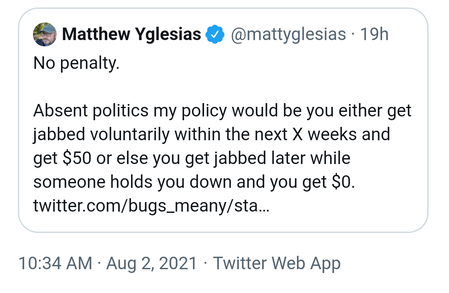|
An op-ed that I wrote with Nicholas Tampio was published in the Washington Post on Saturday. The reaction was much stronger than I anticipated it would be. I was ready for the run-of-the-mill social media negativity that I see on Twitter everyday, but the vitriol in the article's comments and in Twitter replies was really something else. One person came to my wall to write that I had "blood on my hands", and no shortage of people questioned my intelligence and moral compass. In our article, Nick and I don't exactly come out against mandates writ large (though some have interpreted it that way), but that pursuing vaccine mandates right now will not be worth the costs. The thing to remember is that we're living through two pandemics at the moment: COVID and rampant political polarization. Getting vaccine numbers up faster while only making our democracy even more pathological is not a wise move. Things weren't helped by Tom Nicholas retweeting it to his 500k followers with such authoritative pronouncements as "It [vaccine mandates] is *exactly* how things work in a democracy, which is why you didn't get polio." For a guy who pronounced the "Death of Expertise," you'd think Nichols would pause to consider that maybe he might want to learn from people who study vaccine hesitancy and resistance before claiming to know what's best, but he hasn't. Nichols, like many people today who decry the declining respect for truth or democracy, is really taking issue with the reality that people think differently than him rather than that they don't respect expertise or act democratically per se. And that's exactly the problem that, as I argue in my book The Divide, underlies contemporary democracies. It's not so much that people are "irrational," but that political opponents are absolutely convinced that they are on the right side of truth, whether they are pro-vaccine or anti-vaxx. This fanatical certitude produces demand for fanatical policy. Just look at Max Boot's now deleted tweet praising vaccine mandates in the notably undemocratic Saudi Arabia, or Matthew Yglesias's suggestion that vaccine resisters should be given the jab by force. A lot of leftists and centrists are just as anti-democratic in their thinking as reactionary conservatives. It's just that that attitude only comes out when there's a population of citizens that refuse to embrace a truth that is accepted by the political mainstream. It's in these moments that self-described liberals and centrists out themselves as technocrats and agitate against the fundamental features of democracy: dialogue, negotiation, and compromise.
But they're not alone. As I demonstrate in my book, plenty of otherwise intelligent people have been confusing democracy with The Truth for quite some time, and that explains a lot of the political gridlock and intransigence in modern democracies. The question will be whether enough of us can rise to the challenge of democratic citizenship in the near term in order to avoid the "death spiral" of polarization that previously infected nations like Venezuela, pre-Pinochet Chile, and pre-Franco Spain. Using mandates as a stick to punish the unvaccinated, especially while also giving the appearance that it's motivated by partisanship, will make a polarization death spiral in this country a real possibility. **** But that's not the only thing that I've noticed in the reaction to the piece. First, many vaccine mandate advocates are unsurprisingly similar to the vaccine hesitant citizens in how they perceive risk. It's just in the opposite direction. One commenter described being worried everyday about her 3 year old ending up in the ICU with COVID. That's certainly a possibility, but the risk to children is actually not much more than it has been for other long-prevalent viruses like the flu and RSV. It's common to chide the vaccine hesitant for their "irrational fear" of vaccine side-effects, but plenty of vaccine supporters have a similarly outsized worries about COVID. Both should be considered "legitimate" concerns that we ought to take seriously, even if the goal is to eventually lessen the magnitude of those worries. The more annoying argument is the comparison between getting vaccinated and driving drunk: We don't let people onto public roads while drunk, why should we let the "reckless" unvaccinated into public spaces. This is a terrible metaphor. No one comes into the world drunk or driving the automobile, but we were all born without immunity to COVID. A person has to explicitly imbibe alcohol to become a drunk driver, while not being a COVID spreader (well, less of one) means permitting someone to inject a vaccine into your body. The metaphor completely blinds us to all of the important differences in these cases, making it easier to ignore the immense amount of trust in doctors, the FDA, and the pharmaceutical industry that it takes to get vaccinated. Plus, it reduces human beings to being disease-ridden virus vectors, which is somewhat dehumanizing. I think it's better to think of herd immunity as like an airplane, except it's an enormous plane that some 80 percent of us have to board before it can take off. People fear flying. They have to give up control. They have to trust the pilot, the FAA, and that engineers at companies like Boeing are all doing their jobs diligently. Would we strap people into their seats in that case or talk to them to try to alleviate their fears? Other thing that I've learned from some of the emails that I've received is that there's a big overlap between "essential workers" and the vaccine hesitant. At my own college and others throughout the country, it is staff and not faculty who are shunning the vaccine. At hospitals, it is nurses and orderlies who more often refuse, not doctors. Those of us who have been relatively shielded from most of the harms of COVID are often the ones most ardent in calling for mandates. A reader who emailed me framed it as "The professional class took none of the risks during the pandemic and are now forcing an experimental vaccine on us." That's a perspective that I hadn't considered, and it's one that I'm still thinking about. I think it explains some of the class dynamics of vaccine mistrust. One final realization that I've had concerns vaccines as technological fixes. Dan Sarewitz wrote that he thought they were the best example of using a technology to sidestep the social complexities and difficulties in solving a tenacious public problems. I now think that he's wrong. The techno-fix for disease like COVID-19 is treatment, not vaccine. This should be obvious, given how many of the vaccine hesitant have latched onto to uncertain treatments like Invermectin. Vaccines, like I noted above, require immense amounts of trust. They also ask that people who are not currently sick take a form of medicine. Treatments don't. People who are exceptionally sick see risks differently. They're looking to get better, not avoid getting sick. In light of the fact that pandemics aren't going to disappear anytime soon, we may want to put as much R&D into improving treatment options as into developing vaccines. We would be better off having a techno-fix that lets us temporarily sidestep the messy problem of vaccine hesitancy, giving us more time to engage with the vaccine hesitant, to hear their concerns, and build trust. Comments are closed.
|
Details
AuthorTaylor C. Dotson is an associate professor at New Mexico Tech, a Science and Technology Studies scholar, and a research consultant with WHOA. He is the author of The Divide: How Fanatical Certitude is Destroying Democracy and Technically Together: Reconstructing Community in a Networked World. Here he posts his thoughts on issues mostly tangential to his current research. Archives
July 2023
Blog Posts
On Vaccine Mandates Escaping the Ecomodernist Binary No, Electing Joe Biden Didn't Save American Democracy When Does Someone Deserve to Be Called "Doctor"? If You Don't Want Outbreaks, Don't Have In-Person Classes How to Stop Worrying and Live with Conspiracy Theorists Democracy and the Nuclear Stalemate Reopening Colleges & Universities an Unwise, Needless Gamble Radiation Politics in a Pandemic What Critics of Planet of the Humans Get Wrong Why Scientific Literacy Won't End the Pandemic Community Life in the Playborhood Who Needs What Technology Analysis? The Pedagogy of Control Don't Shovel Shit The Decline of American Community Makes Parenting Miserable The Limits of Machine-Centered Medicine Why Arming Teachers is a Terrible Idea Why School Shootings are More Likely in the Networked Age Against Epistocracy Gun Control and Our Political Talk Semi-Autonomous Tech and Driver Impairment Community in the Age of Limited Liability Conservative Case for Progressive Politics Hyperloop Likely to Be Boondoggle Policing the Boundaries of Medicine Automating Medicine On the Myth of Net Neutrality On Americans' Acquiescence to Injustice Science, Politics, and Partisanship Moving Beyond Science and Pseudoscience in the Facilitated Communication Debate Privacy Threats and the Counterproductive Refuge of VPNs Andrew Potter's Macleans Shitstorm The (Inevitable?) Exportation of the American Way of Life The Irony of American Political Discourse: The Denial of Politics Why It Is Too Early for Sanders Supporters to Get Behind Hillary Clinton Science's Legitimacy Problem Forbes' Faith-Based Understanding of Science There is No Anti-Scientism Movement, and It’s a Shame Too American Pro Rugby Should Be Community-Owned Why Not Break the Internet? Working for Scraps Solar Freakin' Car Culture Mass Shooting Victims ARE on the Rise Are These Shoes Made for Running? Underpants Gnomes and the Technocratic Theory of Progress Don't Drink the GMO Kool-Aid! On Being Driven by Driverless Cars Why America Needs the Educational Equivalent of the FDA On Introversion, the Internet and the Importance of Small Talk I (Still) Don't Believe in Digital Dualism The Anatomy of a Trolley Accident The Allure of Technological Solipsism The Quixotic Dangers Inherent in Reading Too Much If Science Is on Your Side, Then Who's on Mine? The High Cost of Endless Novelty - Part II The High Cost of Endless Novelty Lock-up Your Wi-Fi Cards: Searching for the Good Life in a Technological Age The Symbolic Analyst Sweatshop in the Winner-Take-All Society On Digital Dualism: What Would Neil Postman Say? Redirecting the Technoscience Machine Battling my Cell Phone for the Good Life Categories
All
|


 RSS Feed
RSS Feed